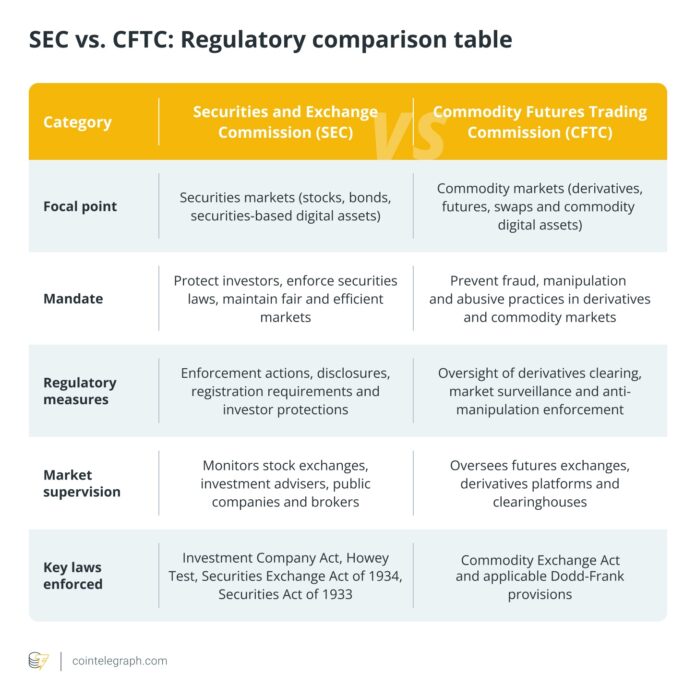Understanding the US Crypto Bill: A New Era for Digital Assets
The US cryptocurrency industry has long grappled with a regulatory paradox: determining when a digital asset is considered a security and when it is considered a commodity. This uncertainty has hindered institutional adoption, fueled litigation, and made it challenging for crypto companies to navigate complex rules. However, a new bill proposed by the Senate Agriculture Committee, led by Chairman John Boozman and Senator Cory Booker, aims to resolve this issue and provide clarity on the classification of digital assets.
The bill is part of a broader effort to create a unified framework for digital asset markets. It outlines how the US could classify crypto assets and assign regulatory responsibilities, which would help resolve the long-standing debate over whether crypto assets are commodities or securities. This proposal is a significant step towards establishing a clear federal distinction between digital goods and digital securities.
Defining Digital Goods and Digital Securities
The bill introduces the concept of a digital commodity, which would include coins such as Bitcoin (BTC) and Ether (ETH). A digital commodity is essentially an exchangeable token that can be owned outright and transferred directly to another person without an intermediary. These digital commodities would be regulated by the Commodity Futures Trading Commission (CFTC), rather than the Securities and Exchange Commission (SEC).
This classification would have significant implications for the industry. For instance, banks, funds, and trusts could hold digital commodities without violating federal regulations. Companies would no longer have to worry about the SEC unexpectedly declaring their token a security. Moreover, digital commodities that are considered “safe” would likely see higher trading volume, more derivatives activity, and greater institutional participation.
Categorization of Coins and Shift in Regulatory Powers
The bill clarifies what counts as a commodity but does not fully define what counts as a security. The classification of decentralized finance (DeFi) projects, governance tokens, and hybrid tokens will be determined later. If a token does not fit into the “digital commodity” category, exchanges, issuers, and wallet providers can expect it to be subject to SEC scrutiny.
The bill proposes three lines of regulation: clear rules for commodities, including major assets like Bitcoin and Ether; more stringent, security-like oversight for many utility tokens, governance tokens, and tokenized assets; and strict requirements for issuing new tokens, including disclosure and compliance checks. The design of a token determines how it will be regulated, depending on three key factors: how decentralized it is, what purpose it serves, and how it is sold.
Stricter Operating Standards for Crypto Companies
Beyond classification, the bill sets operational and risk management requirements to address vulnerabilities in the cryptocurrency sector. For instance, crypto exchanges would be prohibited from combining trading, custody, brokerage, and market-making functions within a single entity. Instead, they would need to separate these roles, similar to the structure used in traditional finance.
Exchanges would only be allowed to list digital goods that meet certain integrity standards, which could significantly reduce the number of unreliable tokens on US platforms. The draft proposes strengthening consumer protection, including protection of customer assets, clear and full disclosure, transparent test protocols, and mandatory reporting and compliance obligations.
Implications for Crypto Stakeholders
The proposed bill represents a pivotal moment for the digital asset ecosystem. From established exchanges and institutional investors to retail traders and federal regulators, the framework would affect all key stakeholders.
For Token Issuers
Projects would have to check whether their tokens are considered digital goods. The more decentralized a network is and the fewer intermediaries it relies on, the stronger the commodity status is. Tokens that do not meet the criteria would remain under SEC supervision and may be subject to more stringent requirements.
For Stock Exchanges and Brokers
Companies would have to separate resources and avoid conflicts of interest, list only assets that are not “easily manipulated,” and strengthen consumer protection. Although these changes could increase costs, they are expected to increase institutional confidence and support a more mature market structure.
For Institutional Investors
Institutional investors are likely to benefit the most from the proposed bill. With defined classifications and federal oversight, fiduciaries may be more willing to pursue large-scale adoption. Major asset managers have long cited the lack of clear federal rules as the biggest obstacle to adding crypto to portfolios.
For Retail Users
Retail users could experience fewer fraudulent schemes, higher operating standards, and greater trust in regulated assets. However, the supply of unconventional tokens available for trading could shrink.
For more information on the US crypto bill and its implications, visit Cointelegraph.

